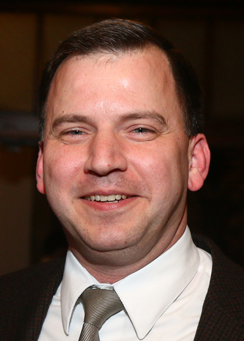
Adam Dickerson
How priests can better prepare couples for marriage, how society understands marriage today and how the church can respond to that understanding was a topic for the annual spring workshop for priests April 10-12 at Malvern Retreat House’s Family Life Center.
Adam Dickerson, coordinator of marriage preparation for Ascension Press, spoke to 104 priests in his opening conference, “Recreating a Christian Culture for Marriage.”
This year’s workshop, titled “The Sacrament of Marriage: Concretely Applied,” is designed to assist priests’ engagement in the three-year archdiocesan initiative Remain in My Love, for the renewal of marriage and family life, which began last year.
Topics covered during the three-year implementation of Remain in My Love are the sacramentality of marriage, the goods of marriage (unity, indissolubility and fruitfulness) and the family as the domestic church.
It’s “the duty of the church,” Dickerson said, to offer a “paradigm shift” to “turn the tide” of contemporary secular culture, since “we’re not living in a society which supports marriage.”
[hotblock]
The youngest of 12 children and parent of seven children with his wife, Sarah, to whom he has been married for 17 years, Dickerson advised priests to “be yourself well” and “have a conviction.”
Commenting on the prevalence of “inadequate catechesis” and “lack of personal encounter,” the former diocesan high school teacher and current head of Martin Saints Classical High School in Oreland urged his priest audience to “encourage and empower the laity. There’s a whole vineyard we can empower.”
Dickerson cited the Marriage and Family Survey conducted last summer throughout the five-county Archdiocese of Philadelphia. The first of the six most repeated themes that emerged from the 200 survey responses returned called for “bold, clear, univocal teaching, especially in homilies.”
“Living a relationship with Jesus Christ,” Dickerson said, “is how we turn the tide.”
Presenters for the next four conferences included Bill Donaghy, a full-time content and curriculum specialist, instructor and international speaker with the Theology of the Body Institute, and Damon Owens, an international Catholic evangelist and founder and executive director of “joytob” (“Joy To Be”), a ministry described as “Stewardship: A Mission of Faith.”
[hotblock2]
Father Matthew W. Guckin, director of Catholic Mission and Identity, Secondary and Collegiate Education, with the archdiocesan Office for Catechetical Formation, presented the workshop’s closing conference, “The 2018 Synod: Pope Francis’ Desire for Young People to Remain in God’s Love.”
To gather data for the synod, Father Guckin conducted a survey of youth (ages 16-29), asking them to respond to eight questions from a synod worksheet.
An analysis of the 897 survey responses returned revealed key findings: youth want to gather with other young people; they value serving others; they find their future to be challenging; they are pressured by the surrounding culture; they feel judged by the church; they have a different ethos regarding morality and they recommend the church use social media more to communicate.
See the complete Synod Survey Report on Youth and read CatholicPhilly.com’s coverage of the report last fall.
***
Father Quindlen is pastor of Epiphany of Our Lord Parish, Plymouth Meeting.
PREVIOUS: Archdiocese reveals investments in child protection, victim aid
NEXT: Ukrainian Catholic archbishop of Philadelphia resigns


Unwarranted are the negative interpretations of the preaching of priests stated in paragraph 7. Priests certainly have been teaching earnestly and correctly on marriage in the Catholic Church. The view holds for this workshop and other presentations and writings: only a priest has the right line on things. The matter is not one of elevating lay involvement but one of lay people listening to and heeding their bishop and priests. Empowering is an old cliché that refers to a position of increased strength whose intent and result are not the domain of a layperson in ecclesiastical subjects. Lay people, rather, should defend the authority and goodness of all priests. The presentation in the workshop by this layman is uninformed and presumptuous. Lay people, nonordained Religious, and Permanent Deacons take instruction from priests, not the other way around.